- Home
- Frederick Marryat
The Privateer's-Man, One hundred Years Ago Page 12
The Privateer's-Man, One hundred Years Ago Read online
Page 12
CHAPTER XII.
I state my newly-awakened scruples as to the lawfulness of a Privateer's-man's Life to Mr. Trevannion, but nevertheless undertake another Cruise--Save a Youth from drowning, who he proves to be--Conflict with a French Privateer--Take her and deliver a Prize--Return to Liverpool--Resign the Command of the Sparrow-Hawk, and agree to superintend Mr. Trevannion's Business.
Miss Trevannion, my dear Madam, was taller than your sex usually are,her figure slight, and still unformed to a certain degree, butpromising perfection. Her hair was very dark, her features regular andhandsome, her complexion very pale, and her skin fair as the snow. Asshe stood in silence, she reminded you of a classical antique statue,and hardly appeared to breathe through her delicate lips, but when shewas animated with conversation, it almost reminded you of thePromethean fire which poets state was stolen from Heaven to animate apiece of marble. Then the colour came in her cheeks, intelligenceplayed on her countenance, and every thing which at first sightappeared wanting, was, like magic, found to light up her face. Hersmiles were the sweetest I ever beheld, and one of those smiles shebestowed upon me as I entered the room and paid her my obeisance. Thenight before, I had not observed her much, I was too busy with herfather and Captain Levee, and she sat remote from the table anddistant from the light, and she never spoke but when she took my handand thanked me, as I mentioned before. I thought then that her voicewas like a silver bell, but made no other remark upon her. We had,however, exchanged but few words before her father came in,accompanied by Captain Levee, and we sat down to our morning's repastof chocolate.
After we had broken our fast, Captain Levee hastened away on board ofhis vessel. My imprisonment had detained him from sailing, and Mr.Trevannion was anxious that he should be off as soon as possible tomake up for lost time, as the expenses of the vessel were heavy.
"Farewell, Elrington, for the present," said he; "I shall come to youon board of your schooner some time during the day." When CaptainLevee was gone--for, to tell the truth, I was afraid of hisridicule--I thought it a good opportunity to give my thoughts to myowner, and as I had nothing to say, which his daughter might not hear,I began as follows:
"Mr. Trevannion, I think it right to state to you that during myimprisonment a great change has come over my feelings upon certainpoints. I am not ashamed to acknowledge that it has been occasioned bythe death which stared me in the face, and from my having seriouslycommuned with myself, and examined, more than I perhaps have doneduring the whole of my former life, the sacred writings which aregiven us as our guide. The point to which I refer is, that I have cometo a conviction that privateering is not a lawful or honourableprofession, and with these feelings I should wish to resign thecommand of the schooner which you have had the kindness to give me."
"Indeed, Elrington," replied Mr. Trevannion. "Well, I should not havethought to have heard this from you I confess. Much as I respect yourscruples, you are too scrupulous. I can hardly imagine that you haveturned to the sect of the Quakers, and think fighting is contrary tothe Scriptures."
"No, Sir, not so far as that. I consider war, as a profession, bothnecessary and honourable, and a nation is bound to be prepared for anyforeign attack, and to act upon the defensive, or on the offensive, ifit is necessary. It is not that. I do not consider the soldier whofights for his country is not doing his duty, nor the seamen who areemployed by the state are not equally justified in their profession.What I refer to is privateering. That is, vessels fitted out for thepurpose of aggression by private merchants, and merely for the sake ofprofit. They are not fitted out with any patriotic motives, but merelyfor gain. They are speculations in which the lives of people on bothsides are sacrificed for the sake of lucre--and had you witnessed suchscenes of bloodshed and cruelty as I have during my career, suchdreadful passions let loose, and defying all restraint, you wouldagree with me, that he who leads such miscreants to their quarry hasmuch to answer for. Were it possible to control the men on board of aprivateer as the men are controlled in the king's service, it might bemore excusable; but manned as privateers always will be, with the mostreckless characters, when once they are roused by opposition,stimulated by the sight of plunder, or drunken with victory, no poweron earth can restrain their barbarity and vengeance, and a captain ofa privateer who attempted, would, in most cases, if he stood betweenthem and their will, unless he were supported, fall a victim to hisrashness. All this I have seen; and all I now express I have longfelt, even when younger and more thoughtless. You know that I did giveup privateering at one time, because I was shocked at the excesses towhich I was a party. Since that, I have accepted the command of avessel, for the idea of being captain was too flattering to my vanityto permit me to refuse; but reflection has again decided me not toengage in it further. I hope this communication will not displeaseyou, Mr. Trevannion. If I am wrong in my opinion, at all events I amsincere, for I am giving up my only source of livelihood from a senseof duty."
"I know that you are sincere, Elrington," replied Mr. Trevannion, "butat the same time I think that you are much too strait-laced in youropinions. When nations are at war, they mutually do all the mischiefthat they can to each other, and I cannot see what difference there isbetween my fitting out a privateer under the king's authority, or theking having vessels and men for the national service. The governmentfit out all the vessels that they can, and when their own funds areexhausted, they encourage individuals to employ their capital inadding to the means of distressing the enemy. If I had property on thehigh seas, would it be respected any more than other English propertyby the enemy? Certainly not; and, therefore, I am not bound to respecttheirs. The end of war is to obtain an honourable peace; and the morethe enemy is distressed, the sooner are you likely to obtain one. I donot, therefore, consider that privateering is worse than any otherspecies of warfare, or that the privateer's-man is a whit morereckless or brutal than soldiers or men-of-war's men in the hour ofvictory in the king's service."
"There is this difference, Sir," replied I; "first, in the officerscommanding; although glad to obtain prize-money, they are stimulatedby nobler feelings as well. They look to honour and distinction; theyhave the feeling that they are defending their king and country, tosupport them and throw a halo on their exertions; and they have suchcontrol over their men, that, although I admit they are equallyinclined to excess as the privateer's-man, they are held in check bythe authority which they dare not resist. Now, Mr. Trevannion,privateer's-men seek not honour, and are not stimulated by a desire toserve the country; all they look to is how to obtain the property ofothers under sanction; and could they without any risk do so, theywould care little whether it was English property or not, providedthat they put the money into their pockets. If I held this opinion asa seaman on board of a privateer, what must I feel now, when I am theleader of such people, and the responsibility of their acts is thrownupon my shoulders, for such I feel is the case?"
"I think," replied Mr. Trevannion, "that we had better not discussthis question any further just now. Of course you must decide foryourself; but I have this favour to ask of you. Trusting to yourresuming the command of the vessel, I have no one to replace you atpresent, and I hope you will not refuse to take the command of her forone more cruise: should you, on your return and on mature reflection,be of the same opinion as you are now, I certainly shall no longerpress you to remain, and will do all I can to assist you in any otherviews you may have."
"To that, Sir, I can have no objection," replied I; "it would beunfair of me to leave you without a captain to the vessel, and I amtherefore ready to sail in her as soon as you please, upon theunderstanding that I may quit her, if I am of the same opinion as I amnow, upon my return to port."
"I thank you, my dear Sir," said Mr. Trevannion, rising, "that is allI request. I must now go to the counting-house."
So saying, he left the room, but his countenance showed that he wasfar from pleased.
Miss Trevannion, who had been a silent listener to th
e conversation,as soon as her father had closed the door after him, thus spoke:
"Captain Elrington, the opinion of a young maiden like me can be oflittle value, but you know not how much pleasure you have given me bythe sentiments you have expressed. Alas! that a man so good, sogenerous, and so feeling in every other respect, should be led away bythe desire of gain, to be the owner of such a description of property.But in this town, wealth is every thing; the way by which it isobtained is not thought of. My father's father left him a largeproperty in vessels employed wholly in the slave-trade, and it wasthrough the persuasions of my poor mother, that my father was inducedto give up that nefarious traffic. Since that, his capital has beenchiefly employed in privateering, which, if not so brutal anddisgraceful, is certainly nearly as demoralizing. I have been home buta short time, and I have already ventured to express my opinion,certainly not so forcibly and so well as you have, upon the subject;but I was laughed at as a tender-hearted girl, who could not be a fitjudge of such matters. But now that you, a captain of one of hisvessels, have expressed your dislike to the profession, I think somegood may arise. If my father were a poor man, it would be moreexcusable, if excuse there can be, but such is not the case. He iswealthy, and to whom has he to leave his wealth but to me, his onlychild? Captain Elrington, you are right--be firm--my father'sobligations to you are very great, and your opinion will have itsinfluence. I am his daughter--his only daughter--his love for me isgreat, I know, and I also have my power over him. Supported as I havebeen by you, I will now exert it to the utmost to persuade him toretire from further employment of his means in such a speculation. Ithanked you yesterday, when I first saw you, for your noble behaviour,I little thought that I should have again, in so short a time, toexpress my thanks."
Miss Trevannion did not wait for any reply from me, but then quittedthe room.
I must say, that although so young a person, I was much pleased atMiss Trevannion's approval of my sentiments. She appeared, from thevery short acquaintance I had had with her, to be a person of a firmand decided disposition, and very different from the insipid class offemales generally met with. Her approval strengthened my resolution;still, as I had promised her father that I would go another cruise inthe privateer, I left the house and went on board to resume thecommand. My return was joyfully hailed by the officers and men, whichis not always the case. I found her, as may be supposed, ready for seaat a minute's warning, so that I had nothing to do but to embark myeffects, which I did before the noon was passed, and then went onshore to Mr. Trevannion, to receive his orders. I found him withCaptain Levee in the back room; and I told Mr. Trevannion that I hadresumed the command, and was ready to sail as soon as he pleased.
"We must make up for lost time, Elrington," replied he; "I haveordered Captain Levee to cruise to the northward of the Western Isles,occasionally working up as far as the Scilly Isles. Now, I think, youhad better take your ground in the Channel, between Dunkirk andCalais. There is as much to be made by salvage in recapturing Englishvessels in that quarter, as there is in taking the enemy's vessels;and I am sure," added Mr. Trevannion, smiling, "you will think thatlegitimate warfare."
At this Captain Levee laughed, and said, "I have been told what yousaid to Mr. Trevannion, Elrington. I said that it was the effects ofbeing condemned for high treason, and would wear off in athree-months' cruise."
"Good impressions do wear off very soon, I fear," replied I; "but Ihope that it will not be the case in this instance."
"We shall see, my good fellow," replied Captain Levee; "for my part Ihope they will, for otherwise we shall lose the best privateer's-man Iever fell in with. However, it's no use bringing up the question now,let us wait till our cruises are over, and we meet again. Good-bye,Elrington, and may you be fortunate. My anchor is short stay apeak,and I shall be under sail in half an hour."
Captain Levee sailed at the time that he mentioned; I remained atanchor till the next morning, and then once more was running down theIrish Channel before a stiff breeze. I forgot to mention that whileat Mr. Trevannion's I had looked at the address of the Catholic priestwho had announced to me my release from prison, and had left copies ofit, as well as of that of the lady at Paris, in the care of Mr.Trevannion. It was now cold, autumnal weather, and the Channel was butrough sailing-ground. During the first fortnight we were fortunateenough to make two recaptures of considerable value, which arrivedsafely in the Thames, after which we had a succession of gales frontthe southward, it being the time of the equinox, which drove us closeto the sands of Yarmouth, and we even had difficulty in clearing themand getting into sea-room by standing to the eastward. The weatherstill continued very bad, and we were lying-to under storm sails forseveral days, and at last found ourselves a degree and a half to thenorthward, off the coast of Norfolk, when the weather moderated, andthe wind changed to the northward. It was a fine clear night, but withno moon, and we were running before the wind to regain ourcruising-ground; but the wind again shifted and baffled us, and atlast it fell light, and, being on a wind, we did not make more thanfour miles an hour, although there was very little sea. About oneo'clock in the morning, I had gone on deck, and was walking to and frowith the first officer, Mr. James, when I thought that I heard a fainthallo from to windward.
"Stop," said I; "silence there forward."
I listened, and thought that I heard the cry again. "Mr. James," saidI, "did you not hear some one shout?"
"No, Sir," replied he.
"Wait, then, and listen."
We did so, but I could not hear it repeated.
"I am certain that I heard a voice as if on the waters," said I."Perhaps some one has fallen overboard. Turn the hands up to muster,and haul the fore-sheet to windward."
The men were mustered, but no one was missing.
"It was your fancy, Sir," observed the first officer.
"It may have been," replied I; "but I am still in my own mindpersuaded that such was the case. Perhaps I was mistaken."
"Shall we let draw the fore-sheet, Sir?" said Mr. James.
"Yes, we may as well; but the wind is lighter than it was. I think weshall have a calm."
"It will be as much as she can do to stem the tide and hold her own,"observed Mr. James. "Let draw the fore-sheet, my lads."
Somehow or another I had a feeling which I could not surmount, that Icertainly had heard a faint shout, and although admitting such to bethe case, there was little chance of being of service to any one, Ifelt a reluctance to leave the spot, and as I walked the deck silentand alone, this feeling became insurmountable.
I remained on deck till the tide turned, and then, instead of takingadvantage of it so as to gain to the southward, I put the schooner'shead the other way, so as to keep as near as I could to the spot whereI heard the voice, reducing her sail so as just to stem the tide. Icannot now account for my anxiety, which, under the circumstances, Imost certainly never should have felt, unless it was that Providencewas pleased to interpose on this occasion more directly than usual. Icould not leave the deck; I waited for daylight with great impatience,and as the day dawned I had my telescope in my hand looking round thecompass.
At last, as the sun rose from the fog on the horizon, somethingattracted my eye, and I made it out to be the two masts of a vesselwhich had sunk in about six fathoms water. Still I could see nothingexcept the masts. However, to make sure, I made sail on the schooner,and stood towards them. A short tack enabled us to fetch, and in halfan hour we passed the wreck about a half-musket-shot to windward, whenwe perceived an arm lifted up out of the water, and waved to us.
"There is somebody there," said I, "and I was right. Quickly, my lads;fore-sheet to windward, and lower down the stern-boat."
This was done in a minute, and in a short time the boat returned,bringing with them a lad about sixteen years old, whom they had foundin the water, clinging to the masts of the vessel. He was too muchexhausted to speak or move. He was put into bed, covered up withblankets, and some warm spirits and water poured down his th
roat. Wethen hoisted up the boat, and made sail upon the schooner, and I wentdown below to breakfast, rejoicing that I had acted upon the impulsewhich I had felt, and had thus been instrumental in saving the life ofa fellow-creature. A few minutes after he was put into bed, the ladfell into a sound sleep, which continued during the whole of the day.The next morning he awoke greatly recovered, and very hungry, and assoon as he had eaten he rose and dressed himself.
I then sent for him, as I was impatient to see him and learn hishistory. When he entered the cabin, it struck me I had seen hisfeatures before, but where I could not say. To my inquiries he statedthat the brig was the Jane and Mary, of Hull, laden with coals; thatthey had started a wooden end during the gale, and that she had filledso rapidly that they got the boat from off the boom to save theirlives, but from the heavy sea running, and the confusion, the boat hadbeen bilged against the bulwarks, and went down as they were shovingoff; that he had supported himself by one of the oars, and was soonseparated from his companions who floated around him; that during thistime the brig had sunk, and he, clinging to the oar, had been drawntowards her as she sank, and carried some feet under water. On hisrising he perceived the top-gallant masts above water, and had madefor them, and on looking round he could not see any of the rest of thecrew, who must have all perished; that he had been two days on themast, and was perished with cold. Finding that his feet, which hungdown on the water, were much warmer than the other portions of hisbody exposed to the wind, he had sunk himself down in the water, andremained there, and had he not done so, he must have perished.
I asked him how long he had been at sea, and he said he had only goneone voyage, and had been but three months on board. There wassomething in his manner so superior to the condition of apprentice(which he stated himself to be) on board of such a vessel; and I feltsuch an interest, which I could not account for, towards the lad, thatI then asked who were his friends. He replied, stammering, that hehad not a friend in the world except a brother older than himself bymany years, and he did not know where he was.
"But your father's name? Is he alive, and who is he? You must tell methat, or I shall not know where to send you."
The youth was very confused, and would not give me any answer.
"Come, my lad," I said, "I think as I have saved your life, I deservea little confidence, and it shall not be misplaced. I perceive thatyou have not been brought up as a lad for the sea, and you musttherefore trust me."
"I will, Sir," he replied, "if you will not send me back to my fatherand--mother."
"Certainly not against your will, my good lad," I replied, "although Ishall probably persuade you all I can to return to them. I presume youran away from your home?"
"Yes, Sir, I did," replied he; "for I could not possibly stay thereany longer, and my brother did so before me, for the same reason thatI did."
"Well, I promise you, if you will confide in me, that I will not forceyour inclinations, so now tell me who are your father and mother, andwhy you left home. You want a friend now, and without confidence youcannot expect friendship."
"I will tell you all, Sir," he replied, "for I see by your face thatyou will not take advantage of me."
He then commenced, and you may imagine my surprise, my dear Madam,when I found that it was my own brother Philip, whom I had left achild of ten years old, who was addressing me. He had, as he hadasserted, left his home and thrown himself on the wide world for thesame reason which I had; for his spirit, like mine, could not brookthe treatment which he received. I allowed him to finish hisnarrative, and then made myself known to him.
You may imagine the scene, and the delight of the poor fellow, who, ashe encircled me in his arms, clinging to me with the tears of joy onhis cheeks, told me that his great object had been to find me out, andthat although he had no idea what had become of me, he thought itmost likely that I had taken to a seafaring life.
I now felt certain that Providence had specially interposed in thisbusiness, and had, for its own good reasons, created those unusualfeelings of interest which I described to you, that I might be thesaviour of my brother; and most grateful was I, I can assure you. Ihad now a companion and friend, one to love and to cherish. I was nolonger alone in the world, and I do not know when I had felt so happyfor a long while.
I left my brother below in the cabin, and went on deck to acquaint theofficers with this strange meeting. The intelligence soon ran throughthe vessel, and of course the poor shipwrecked boy became an object ofunusual interest. That whole day I was interrogating and receivingintelligence from him relative to our family. I made him describe hissisters and every member of it, even the servants and our neighbourswere not forgotten, and for the first time since I had quitted home, Iknew what had occurred during the six years of my absence. From theaccounts he gave me, I certainly had no inclination ever to return aslong as certain parties were in existence; and my brother declaredthat nothing but force should ever induce him. The more I talked withhim, the more I was pleased with him. He appeared of a frank, nobledisposition, full of honour and high sentiments, winning in hismanners, and mirthful to excess. Indeed his handsome countenanceimplied and expressed as much, and it did not deceive.
I hardly need say that he took up his quarters in my cabin, and havingprocured for him more suitable apparel, he looked what he was, theperfect young gentleman. He was soon a general favourite on board, notonly with the officers but with the men. One would have thought thatthe danger and distress we had found him in would have sickened himfor the sea for ever; but it was quite the contrary. He delighted inhis profession, and was certainly born to be a sailor. I asked himwhat he felt when he had remained so long clinging to the mast; if hehad not given up all hopes of being saved? and he replied no, that hehad not; that he did not know how long he might have had to remainthere, but that he had never abandoned the idea of being taken off bysome vessel or another, and that he thought that he might havecontinued there for twenty-four hours longer without being exhausted,as after he had sunk himself into the water he felt warm, and noexertion was necessary. It is of such buoyant spirits as these, Madam,that seamen should be made.
You cannot have an idea of the pleasure which I experienced at thisfalling in with my brother Philip. It appeared to have given a newstimulus to my existence; even privateering did not appear so hatefulto me, after I had heard him express his delight at being likely to beso employed, for such he stated had long been his ardent wish. Twodays afterwards we had regained our cruising-ground, and perceived aFrench privateer steering for the port of Calais, in company with alarge merchant vessel which she had captured. The wind was light, andwe discovered her at daybreak, just as the fog cleared away, she beingthen about mid-channel, and not more than five miles distant. We madeall sail, and soon were within gun-shot. The Frenchman appeareddetermined not to part with his prize without a trial of strength, butas the captured vessel was the nearest to us, I decided to retake herfirst, and then fight him if he wished. I therefore steered to lay theprize by the board. The Frenchman, a lugger of twelve guns, perceivingour intention, made also for the prize to defend her, he steering upfor her close-hauled, we running down to her free, the prize lyingbetween us, and sheltering each of us from the other's guns. It isdifficult to say whether the Frenchman or we were the first to touchher sides with our respective vessels; I rather think that theFrenchman was a second or two before us. At all events they werequicker than we were, and were on the deck first, besides having theadvantage of the assistance of their men already on board, so that wewere taken at a great disadvantage. However, we did gain the deck byboarding at two points, forward and aft, and a fierce contest ensued.The French were more numerous than we were, but my men were betterselected, being all very powerful, athletic fellows. Philip hadboarded with the other party forward, which was led by my chiefofficer. My party, who were abaft, not being so numerous, were beatenback to the taffrail of the vessel, where we stood at bay, defendingourselves against the furious assaults of the Frenchmen. But if we
lost, the other party gained, for the whole body of the Frenchmen werebetween us and them, and those who faced Philip's party were drivenback to abaft the mainmast. It so happened that Philip was thrown downon the deck, and his men passed over him; and while in that position,and unable to rise from the pressure upon him, he heard a calling outfrom below: this told him that the English prisoners were in the hold;and as soon as he could rise he threw off the hatches, and they rushedup, to the number of twenty-three stout fellows, to our support,cheering most manfully, and by their cheers announcing to the Frenchthat we had received assistance. This gave fresh courage to my men,who were hard pressed and faint with their great exertion. We cheered,and rushed upon the enemy, who were already weakened by many of themhaving turned round to resist the increased impetus from forward. Ourcheers were replied to by Philip's party and the prisoners, and theFrench were losing the day. They made another desperate rush uponPhilip's men, and succeeded in driving them back to before themain-hatches; but what they gained forward, they lost abaft, as wepushed on with vigour. This was their last attempt. The main-hatchbeing open, several of them in the confusion fell into it, othersfollowed them of their own accord, and at last every one of them wasbeaten down from the deck, and the hatches were put over them, withthree cheers.
"Now, for the privateer--she is our own," cried Philip; "follow me, mymen," continued he, as he sprang upon the bulwarks of the prize, andfrom thence into the main rigging of the lugger alongside.
Most of my men followed him; and as there were but few men left onboard of the lugger, she was soon in our possession, and thus we hadboth the enemy and the prize without firing a cannon-shot. It wasstrange that this combat between two privateers should thus be decidedupon the deck of another vessel, but such was the fact. We had severalmen badly wounded, but not one killed. The French were not quite sofortunate, as seven of their men lay dead upon the decks. The prizeproved to be the Antelope West-Indiaman, laden with sugar and rum,and of considerable value. We gave her up to the captain and crew, whohad afforded us such timely assistance, and they were not a littlepleased at being thus rescued from a French prison. The privateer wasnamed the Jean Bart, of twelve guns, and one hundred and fifteen men,some away in prizes. She was a new vessel, and this her first cruise.As it required many men to man her, and we had the prisoners toincumber us, I resolved that I would take her to Liverpool at once;and six days afterwards we arrived there without further adventure.Philip's gallant conduct had won him great favour with my officers andmen, and I must say that I felt very proud of him.
As soon as we had anchored both vessels, I went on shore with Philipto Mr. Trevannion's, to give him an account of what had occurredduring the short cruise, and I hardly need say that he was satisfiedwith the results, as we had made three recaptures of value besides aprivateer. I introduced Philip to him, acquainting him with hismiraculous preservation, and Mr. Trevannion very kindly invited himfor the present to remain in his house. We then took our leave,promising to be back by dinner-time, and I went with Philip to fit himout in a more creditable way; and having made my purchases and givenmy orders (it being then almost two o'clock _post meridiem_), wehastened to Mr. Trevannion's, that we might be in time for dinner. Iwas, I must confess, anxious to see Miss Trevannion, for she had oftenoccupied my thoughts during the cruise. She met me with greatfriendliness and welcomed me back. Our dinner was very agreeable, andPhilip's sallies were much approved of. He was, indeed, a mirthful,witty lad, full of jest and humour, and with a good presence withal.Mr. Trevannion being called out just as dinner was finished. MissTrevannion observed--
"I presume, Mr. Elrington, that your good fortune and the reputationyou have acquired in so short a time, have put an end to all yourmisgivings as to a privateer's-man's life?"
"I am not quite so light and inconstant, Miss Trevannion," replied I;"I rejoice that in this cruise I have really nothing to lament orblush for, and trust at the same time we have been serviceable to ourcountry; but my opinion is the same, and I certainly wish that I hadfought under the king's pennant instead of on board of a privateer."
"You are, then, of the same mind, and intend to resign the command?"
"I do, Miss Trevannion, although I admit that this lad's welfare makesit more important than ever that I should have some means oflivelihood."
"I rejoice to hear you speak thus, Mr. Elrington, and I think myfather's obligations to you are such, that if he does not assist you,I should feel ashamed of him--but such I am certain will not be thecase. He will forward your views, whatever they may be, to the utmostof his power--at the same time, I admit, from conversations I have hadwith him, that he will be mortified at your resigning the command."
"And so shall I," said Philip, "for I do not agree with you or mybrother: I see no more harm in privateering than in any otherfighting. I suppose, Miss Trevannion, you have been the cause of mybrother's scruples, and I tell you candidly to your face, that I donot thank you for it."
Miss Trevannion coloured up at this remark, and then replied, "I donot think, Mr. Philip, that I have had the pleasure of seeing yourbrother more than three times in my life, and that within these lastsix weeks, and sure I am that we have not had a quarter of an hour'sconversation altogether. It is, therefore, assuredly, too much to saythat I am the cause, and your brother will tell you that he expressedthese opinions before I ever had had any conversation with him."
"That may be," replied Philip, "but you approved of his sentiments,and that concluded the business, I am sure, and I don't wonder at it.I only hope that you won't ask me to do any thing I do not wish to do;for I am sure that I could never refuse you any thing."
"I am glad to hear you say so, Mr. Philip; for if I see you do thatwhich I think wrong, I shall certainly try my influence over you,"replied Miss Trevannion, smiling. "I really was not aware that I hadsuch power."
Here Mr. Trevannion came in again, and the conversation was changed;and shortly afterwards Miss Trevannion left the room. Philip, who wastired of sitting while Mr. Trevannion and I took our pipes, and whowas anxious to see the town, also left us; and I then stated to Mr.Trevannion that having now completed the cruise which I had agreedthat I would, I wished to know whether he had provided himself withanother captain.
"As you appear so determined, my dear Elrington, I will only say thatI am very sorry, and will not urge the matter any longer. My daughtertold me since your absence that she was certain that you would adhereto your resolution; and, although I hoped the contrary, yet I havebeen considering in which way I can serve you. It is not only mypleasure, but my duty so to do; I have not forgotten, and never willforget, that you in all probability saved my life by yourself-devotion in the affair of the Jacobites. When you first came tome, you were recommended as a good accountant, and, to a certaindegree, a man of business; and, at all events, you proved yourselfwell acquainted and apt at figures. Do you think that a situation onshore would suit you?"
"I should endeavour to give satisfaction, Sir," I replied; "but I fearthat I should have much to learn."
"Of course you would; but I reply that you would soon learn. Now,Elrington, what I have to say to you is this: I am getting old, and ina few years shall be past work; and I think I should like you as anassistant for the present, and a successor hereafter. If you wouldlike to join me, you shall superintend the more active portion of thebusiness; and I have no doubt but that in a year or two you will bemaster of the whole. As you know, I have privateers and I havemerchant vessels, and I keep my storehouses. I have done well up tothe present; not so well, perhaps, now, as I did when I hadslave-vessels, which were most profitable; but my deceased wifepersuaded me to give up that traffic, and I have not resumed it, inhonour of her memory. These foolish women should never interfere insuch matters; but let that pass. What I have to say is, that if youchoose after a year to join me as a partner, I will give you an eighthof the business, and as we continue I will make over a further sharein proportion to the profits; and I will make such arrangements as toenable y
ou at my death to take the whole concern upon favourableterms."
Mr. Trevannion knocked the ashes out of his pipe, and, as heconcluded,--
"I am," I replied, "as you may imagine, Sir, much gratified andhonoured at your proposal, which I hardly need say that I willinglyaccept. I only hope you will make allowance for my ignorance at firstsetting off, and not ascribe to any other cause my imperfections. Youmay assure yourself that good-will shall never be wanting on my part,and I shall work day and night, if required, to prove my gratitude forso kind an offer."
"Then, it is settled," said Mr. Trevannion; "but what are we to dowith your brother Philip?"
"He thinks for himself, Sir, and does not agree with me on thequestion in point. Of course, I have no right to insist that myscruples should be his; indeed, I fear that I should have littlechance in persuading him, as he is so fond of a life of adventure. Itis natural in one so young. Age will sober him."
"Then you have no objection to his going on board of a privateer?"
"I would rather that he was in any other service, Sir; but as I cannotcontrol him, I must submit, if he insist upon following thatprofession. He is a gallant, clever boy, and as soon as I can, I willtry to procure him a situation in a king's ship. At present he must goto sea in some way or the other, and it were, perhaps, better that heshould be in good hands (such as Captain Levee's for instance) onboard of a privateer, than mix up with those who might demoralize himmore."
"Well, then, he shall have his choice," replied Mr. Trevannion. "He isa smart lad, and will do you credit wherever he may be."
"If I may take the liberty to advise, Sir," replied I, "I think youcould not do better than to give the command of the Sparrow-Hawk tothe chief officer, Mr. James; he is a good seaman and a brave man,and I have no doubt will acquit himself to your satisfaction."
"I was thinking the same; and as you recommend him, he shall take yourplace. Now, as all this is settled, you may as well go on board andmake known that you have resigned the command. Tell Mr. James that heis to take your place. Bring your clothes on shore, and you will findapartments ready for you on your return, for in future you will ofcourse consider this house as your residence. I assure you that, nowthat you do not leave me, I am almost glad that the affair is arrangedas it is. I wanted assistance, that is the fact, and I hold myselffortunate that you are the party who has been selected. We shall meetin the evening."
Mr. Trevannion then went away in the direction of his daughter's room,instead of the counting-house as usual, and I quitted the house. I didnot go immediately down to the wharf to embark. I wanted to have ashort time for reflection, for I was much overpowered with Mr.Trevannion's kindness, and the happy prospects before me. I walked outin the country for some distance, deep in my own reflections, and Imust say that Miss Trevannion was too often interfering with my trainof thought.
I had of course no fixed ideas, but I more than once was weighing inmy mind whether I should not make known to them who I was, and howsuperior in birth to what they imagined. After an hour passed inbuilding castles, I retraced my steps, passed through the town, andgoing down to the wharf, waved my handkerchief for a boat, and wassoon on board. I then summoned the officers and men, told them that Ihad resigned the command of the vessel, and that in future they wereto consider Mr. James as their captain. I packed up my clothes,leaving many articles for my successor which were no longer of any useto me, but which he would have been compelled to replace.
Philip I found was down in the cabin, and with him I had a longconversation. He stated his wish to remain at sea, saying that hepreferred a privateer to a merchant vessel, and a king's ship to aprivateer. Not being old enough, or sufficient time at sea to beeligible for a king's ship, I agreed that he should sail with CaptainLevee, as soon as he came back from his cruise. He had already sent ina good prize. As soon as my clothes and other articles were put intothe boat, I wished them all farewell, and was cheered by the men as Ipulled on shore.
My effects were taken up to Mr. Trevannion's house by the seamen, towhom I gave a gratuity, and I was met by Mr. Trevannion, who showed meinto a large and well-furnished bed-room, which he told me was infuture to be considered as my own. I passed away the afternoon inarranging my clothes, and did not go down to the parlour tillsupper-time, where I found Miss Trevannion, who congratulated me uponmy having changed my occupation to one more worthy of me. I made asuitable reply, and we sat down to supper. Having described this firstgreat event in my life, I shall for the present conclude.

 The Children of the New Forest
The Children of the New Forest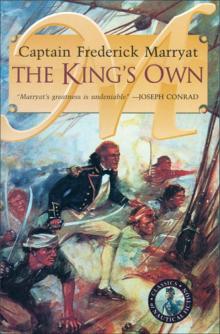 The King's Own
The King's Own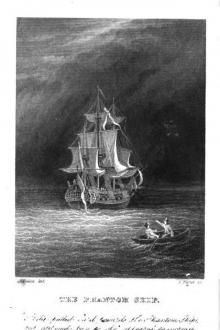 The Phantom Ship
The Phantom Ship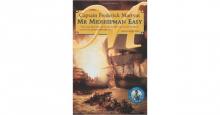 Mr. Midshipman Easy
Mr. Midshipman Easy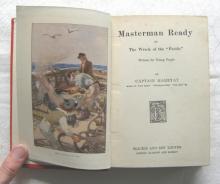 Masterman Ready; Or, The Wreck of the Pacific
Masterman Ready; Or, The Wreck of the Pacific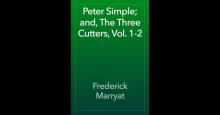 Peter Simple; and, The Three Cutters, Vol. 1-2
Peter Simple; and, The Three Cutters, Vol. 1-2 Travels and Adventures of Monsieur Violet
Travels and Adventures of Monsieur Violet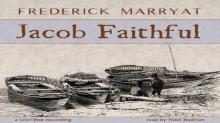 Jacob Faithful
Jacob Faithful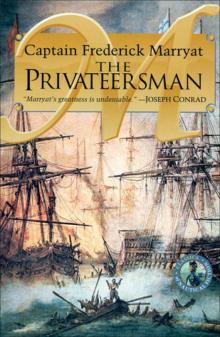 The Privateersman
The Privateersman Newton Forster
Newton Forster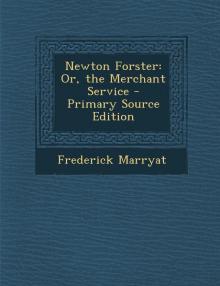 Newton Forster; Or, The Merchant Service
Newton Forster; Or, The Merchant Service The Pacha of Many Tales
The Pacha of Many Tales The Privateer's-Man, One hundred Years Ago
The Privateer's-Man, One hundred Years Ago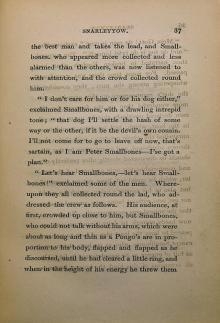 Snarleyyow, or, the Dog Fiend
Snarleyyow, or, the Dog Fiend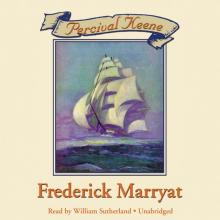 Percival Keene
Percival Keene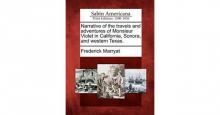 The Travels and Adventures of Monsieur Violet in California, Sonora, and Western Texas
The Travels and Adventures of Monsieur Violet in California, Sonora, and Western Texas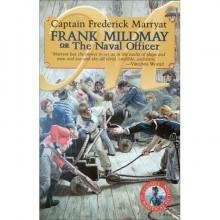 Frank Mildmay; Or, the Naval Officer
Frank Mildmay; Or, the Naval Officer The Mission
The Mission